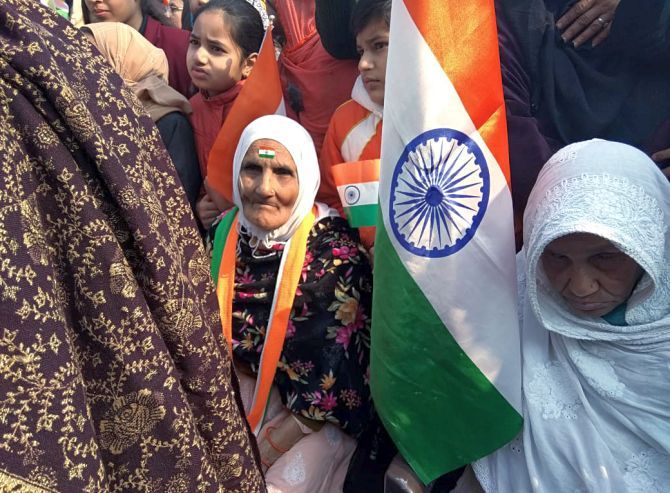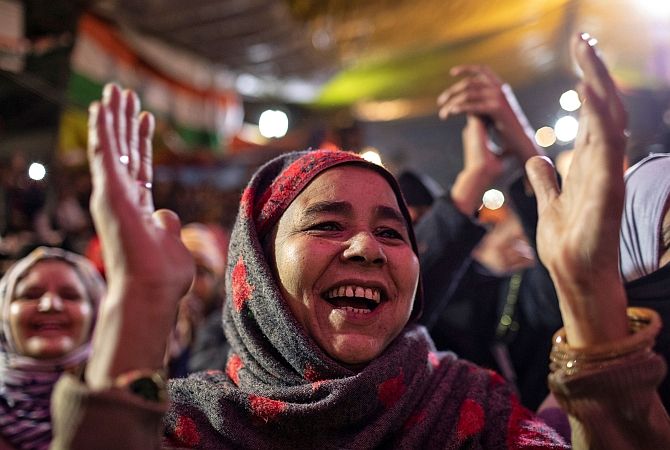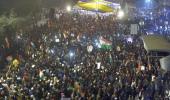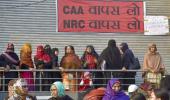'For the women of a community whose seclusion has been a byword of their lifestyle to take to the streets as a means of protest is an unprecedented event,' notes Amulya Ganguli.

India is currently witnessing a unique phenomenon, perhaps without parallel anywhere in the world at any time in the past.
Thousands of Muslim women have come out of their homes to protest against the citizenship law.
In Delhi, Prayagraj (Allahabad), Lucknow, Gaya, Pune, Chennai, Mumbai, Kolkata and elsewhere, they have sat down in open spaces to voice their angst against a law which, they believe, threatens their status as citizens.
For the women of a community whose seclusion has been a byword of their lifestyle to take to the streets as a means of protest is an unprecedented event by all accounts.
It is all the more extraordinary because men have remained very much in the background, thereby overturning all the customary stereotypes about Muslims.
Clearly, a silent churning has been taking place in the community without the other social and religious groups getting an inkling about how the Muslim women are becoming more outgoing.
Their cooperation with the women of other faiths during the demonstrations which were started by the students of various universities is indicative of their commitment to a multicultural polity.
In a way, this turn of events is a reaffirmation by the country's largest community of the idea of India.
For the BJP, this unusual development has posed a problem

As long as the mostly male students and other protesters were in the forefront of the anti-citizenship law agitations, the police could shoot them 'like dogs', as Dilip Ghosh, president of the BJP's West Bengal unit, has said, or bury them alive as UP minister Raghuraj Singh has said.
Indeed, the deaths of 19 youths in UP during the protests and the firing of tear gas by the police in the Jamia Millia university's library in Delhi testified to this trigger-happy attitude of the authorities.
But such peremptory action cannot be taken against women.
Nor is it easy to brand them as anti-nationals which is the BJP's routine charge against its opponents or send them to deradicalisation camps/detention centres.
So the party's supporters have taken recourse to other means, including approaching the law courts over the blocking of roads or accusing the women of being paid for their anti-government stand.
But the protests have shown little sign of abating.
Another feature of the expression of anguish and anger about what the women perceive as an uncertain future is how the politicians have reconciled themselves to playing second fiddle.
They have made occasional appearances at the protest sites to show their solidarity, but have generally chosen to stay away, especially the big guns among them.
The reason perhaps is the realization that the agitation has acquired a momentum under the students and the women because of their wholehearted dedication to the cause which has resonated more widely than in the case of political movements which generally have a partisan and cynical undertone.
Instead, the students and the women are seen to have staked their all with little expectations of reward or even an immediate fulfilment of their demand by an insensitive government, whose dismissive attitude towards the protesters can be discerned in the vicious comments of its supporters in the social media and in several television channels.
However, for all the government's attempts to trash the women as 'bikau'(purchasable) and the other protesters for only representing a certain community who can be identified by their clothes such as pyjamas and skullcaps, there are signs that the authorities are on edge.
As much is evident not only from the foul language which is being used against the protesters, but also from the invocation of the National Security Act in Delhi which allows detention of the accused for three months.
That the official/political response to largely peaceful demonstrations where the National Anthem has been sung and the Preamble to the Constitution read out is the promulgation of a harsh law tells it own tale.

If the response denotes nervousness, it is because the citizenship law, like Kashmir, is beginning to attract adverse international attention.
Moreover, some of the government's allies such as the Janata Dal-United and the Akali Dal have been critical of the law's provisions relating to Muslims.
The haste with which the BJP has announced Nitish Kumar's leadership of the National Democratic Alliance in Bihar months before the state assembly election is due is yet another indication of the government's uneasy state of mind.
Perhaps enthused by the students and the women, the national Opposition, too, is slowly getting its act together as is evident from the resolutions passed by some state assemblies against the citizenship law.
History will show to what extent the protests against the citizenship law will lead to Muslim women becoming an even more integral part of the mainstream and playing a crucial role in opening a new chapter in India's secular journey.
But the 2020s are presenting a scene which no one expected.
Amulya Ganguli is a writer on current affairs










